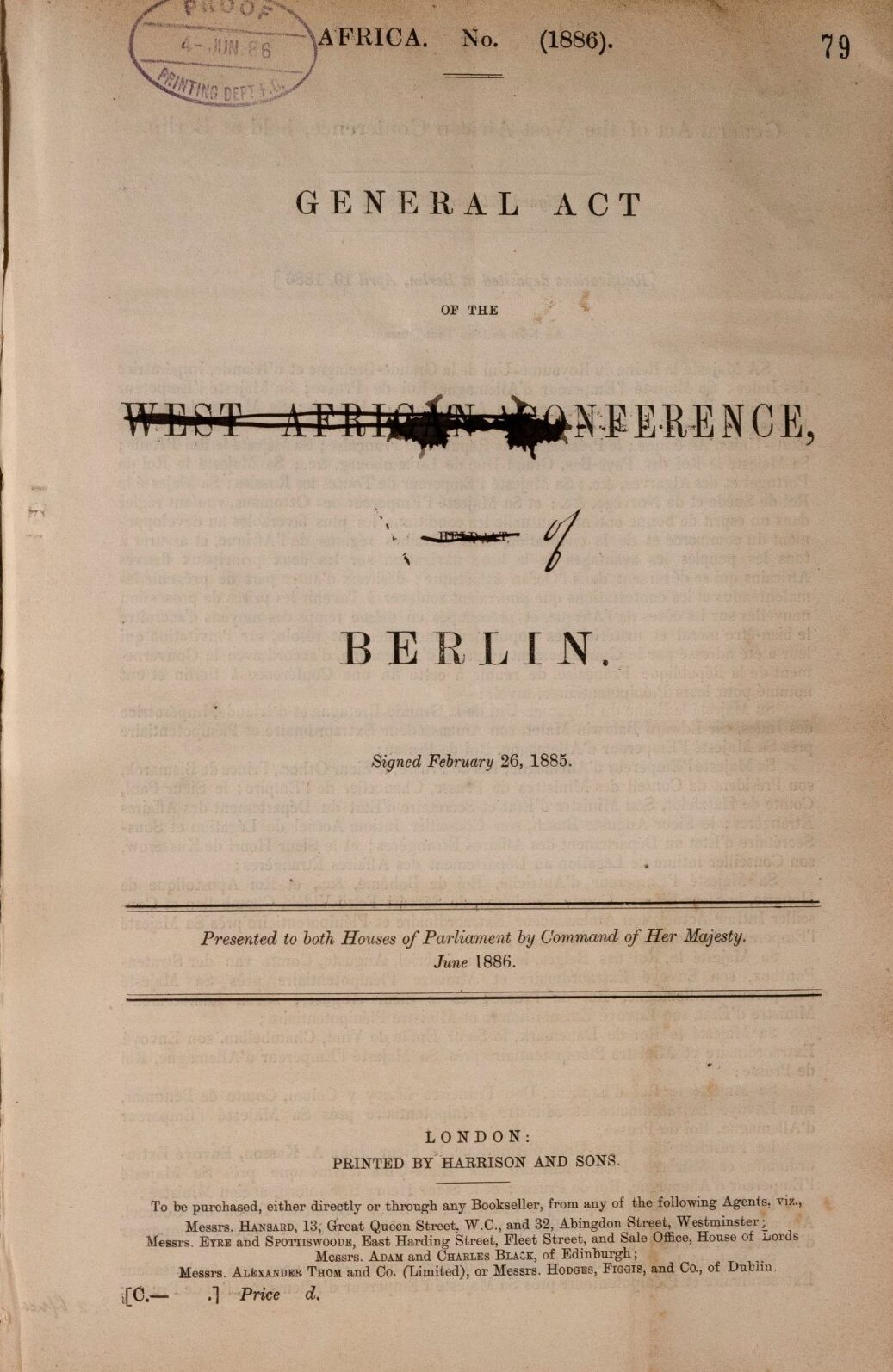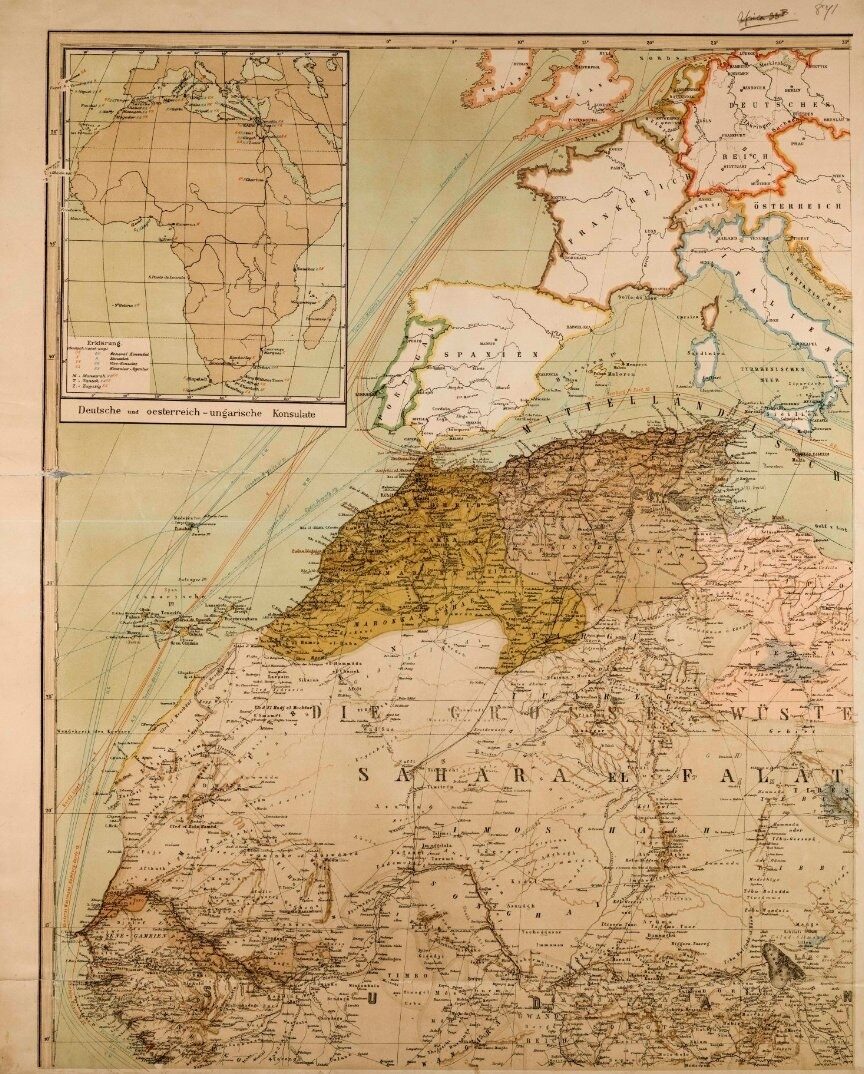The Berlin Conference and the New Imperialism in Africa
The Berlin Conference (1884-1885), also known contemporarily as the West Africa Conference or the Congo Conference, was a pivotal event in accelerating the colonial expansion of European powers into Africa. During the period known as New Imperialism by western historians, various European countries’ desire for wealth and power with the expansion/start of their empires led to the ‘scramble’ to colonise the African continent in the late nineteenth and early twentieth century.
This period is documented in AM’s resource Africa and the New Imperialism: European Borders on the African Continent, 1870-1914 which features digitised primary sources covering the negotiations, power struggles, wars, imperialist regimes, and overall impact of colonisation upon the lives of those living in Africa. Through these documents, the ramifications and significance of the Berlin Conference are felt and revealed.
Prior to 1880, colonisation had begun in Africa, however, these colonies and European-controlled areas were mainly concentrated along the coast. However, various factors caused European nations to ramp up their interest in the continent, such as the Great Depression of 1873-1896, the discovery of precious minerals such as gold and diamonds, and imperial aspirations and rivalries. Thus, the 1870s saw an increase in colonial activity, with European powers beginning to encroach inland into Africa and conflicts arising not only from the resisting Indigenous population, but between the different imperial powers themselves. Indeed, one area of large contention was the Congo Basin and Central Africa, where the early 1880s saw tensions between Belgium, France, Portugal, and Britain (allied with Portugal) over control of the area. With other, similar hostilities beginning to occur across Africa, it was decided among leaders in Europe that an international conference was needed, promoting the idea of cooperation and mutual trade for the benefit of all colonial powers.

The front page of the Berlin General Act document presented to British Parliament in 1886
The conference opened on 15 November 1884 and closed on 26 February 1885 with the signing of the General Act of the Berlin Conference by all fourteen powers that attended: Austria-Hungry, Belgium, Denmark, France, Germany, Great Britain, Italy, The Netherlands, Portugal, Russia, Spain, Sweden-Norway, Turkey, and the United States of America. No Indigenous representatives of Africa were invited, nor had a say in the negotiations. Effectively, this act regulated colonial activity and officially divided Africa up along colonial lines, without any consideration for existing cultural borders. The main points that were cemented by the act were the following:
- Neutrality, free navigation, and trade in the Congo Basin.
- Free navigation of the Niger River.
- The responsibility of the European powers to protect the Indigenous peoples.
- A pledge to end the slave trade on the continent.
- Formalising the regulations with which imperial powers could formally claim land.
Consequently, the Berlin Conference contributed to the rapid colonisation of Africa by formalising the process for European nations to invade and occupy land. By no means however were all of the articles of the act abided. When looking at contemporary documents, the act is mentioned throughout, often by European powers accusing rivals of breaking the terms of the conference, whether that be by not meeting the criteria to effectively occupy land, or observing the exploitation and mistreatment of Indigenous people, which was rampant. Moreover, it did not stop European conflicts in the continent. Yet, it was still a catalyst which vastly increased the colonisation of Africa within a very short period of time.

Reveals part of the map of Africa after the conference, this part showing North West Africa and Europe, the link to the document would then lead the reader to the other pages of the document show the other parts of Africa.
About the author
Eleanor Masters is an Editorial Assistant at AM.
About the collection
Africa and the New Imperialism: European Borders on the African Continent, 1870-1914 is out now. FO 84/1827 and FO 925/871 are available open access for 30 days.
Recent posts

The blog highlights American Committee on Africa, module II's rich documentation of anti-apartheid activism, focusing on the National Peace Accord, global solidarity, and student-led divestment campaigns. It explores the pivotal role of universities, protests, and public education in pressuring institutions to divest from apartheid, shaping global attitudes toward social justice and reform.

This blog examines how primary sources can be used to trace the impact of young voices on society, particularly during pivotal voting reforms in the UK and the US. Explore materials that reveal insights into youth activism, intergenerational gaps, and societal perceptions, highlighting their interdisciplinary value for studying youth culture, activism, and girlhood across history.
